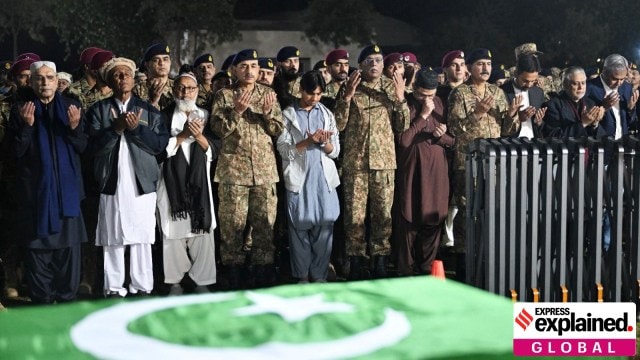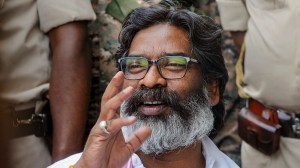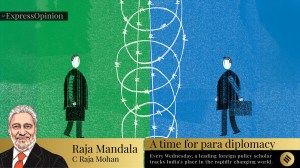- India
- International
Pakistan carries out strikes inside Afghanistan: What is happening, and why
What has led to the tensions between Pakistan and the Taliban, whose return the Pakistani establishment had celebrated? What is the immediate trigger behind Pakistan's actions in Afghan territory? We explain.
 President of Pakistan Asif Ali Zardari, Chief of Army Staff (COAS) Asim Munir, and General Sahir Shamshad Mirza, Chairman Joint Chiefs of Staff Committee (JCSC), along with others attend the funeral of Lieutenant Colonel Syed Kashif Ali, 39 and Captain Muhammad Ahmed Badar, 23, after militants attacked a military post in Mir Ali, North Waziristan district in Pakistan near Afghanistan early on Saturday. (Reuters)
President of Pakistan Asif Ali Zardari, Chief of Army Staff (COAS) Asim Munir, and General Sahir Shamshad Mirza, Chairman Joint Chiefs of Staff Committee (JCSC), along with others attend the funeral of Lieutenant Colonel Syed Kashif Ali, 39 and Captain Muhammad Ahmed Badar, 23, after militants attacked a military post in Mir Ali, North Waziristan district in Pakistan near Afghanistan early on Saturday. (Reuters)After Afghanistan accused Pakistan of killing eight of its citizens in two air strikes, Islamabad Monday (March 18) confirmed that it had carried out “intelligence-based anti-terrorist operations” inside the neighbouring country.
In response, the Taliban government fired at Pakistani troops along the border.
The two countries also exchanged heated rhetoric, with Pakistan accusing Afghanistan of sheltering terrorists and the Taliban denying the charge.
“Pakistan has great respect for the people of Afghanistan. However, certain elements among those in power in Afghanistan are actively patronising TTP [Tehreek-i-Taliban Pakistan] and using them as a proxy against Pakistan. Such an approach against a brotherly country, which stood with the people of Afghanistan through thick and thin, manifests shortsightedness,” the Pakistan Foreign Office said.
Zabiullah Mujahid, spokesman for the Taliban administration, warned: “Pakistan shouldn’t blame Afghanistan for the lack of control, incompetence and problems in its own territory. Such incidents can have very bad consequences which will not be in Pakistan’s control.”

What has led to the tensions between Pakistan and the Taliban, whose return the Pakistani establishment had celebrated? What is the immediate trigger behind Pakistan’s actions in Afghan territory? We explain.
What led to the strikes on Monday?
On Saturday (March 16), a security post in Mir Ali in North Waziristan was attacked, killing seven Pakistani soldiers. The country’s President, Asif Ali Zardari, then vowed retaliation.
 Click here for the free registration link: https://us02web.zoom.us/webinar/register/5817103137458/WN_UmpRL7-kQJ2bRtwANU0Cbg#/registration
Click here for the free registration link: https://us02web.zoom.us/webinar/register/5817103137458/WN_UmpRL7-kQJ2bRtwANU0Cbg#/registration
After Monday’s strikes, the Foreign Office statement said they had targetted terrorists from the Hafiz Gul Bahadur Group, which, along with TTP, was behind “deaths of hundreds of civilians and law enforcement officials”.
Those killed, however, are five women and three children — according to the Taliban, three women and three children were killed in Paktika, near Pakistan’s South Waziristan District, and two women were killed in Khost, near North Waziristan.
In the recent years, attacks by the TTP and the various Pakistan Taliban factions have increased on Pakistani soil. According to Dawn, Hafiz Gul Bahadur was previously a government contractor and considered part of the “good Taliban”. His outfit today “is the strongest militant group in North Waziristan. He was flushed out in Operation Zarb-i-Azb in 2014 and fled to Afghanistan,” the Pakistani newspaper said.
Why are Pakistan’s ties with the Taliban deteriorating?
Ever since the Taliban seized power again in Afghanistan, Pakistan has realised it has a problem on its hands, and not the ally in its neighbourhood it had hoped for. The Taliban’s return has emboldened the TTP and provided it with a safe haven. Ironically, it was Pakistan’s own policies which led to the creation of the TTP.
For decades, Pakistan had promoted hardline Sunni Islam in north and west Pakistan as well as in Afghanistan, where Pashtuns are a majority, to counter Pashtun nationalism. This strategy helped create the Taliban when Afghanistan was under Soviet control in the 1980s.
However, when the US invaded Afghanistan in 2001 as part of its ‘war against terror’, the Pakistan government had to ostensibly support its great benefactor. It was in this context that the Pakistani jihadists created the TTP in 2007. The organisation claimed to be an extension of the Afghan Taliban, with designs to eventually establish a strict Islamic state, free of American influence, in Pakistan.
While Pakistan’s security forces have had successes against the TTP, after returning to power in Afghanistan, the Taliban regime there has apparently strengthened the TTP, showing signs of being more loyal to the militant faction than to the Pakistan state.
Another flashpoint between Pakistan and the Taliban regime recently has been Islamabad’s decision to deport thousands of Afghan immigrants. Pakistan has said that with its own economy in shambles, it can ill-afford immigrants who do not pay taxes, and are “involved in street crimes and militant attacks”.
More Explained
EXPRESS OPINION
May 22: Latest News
- 01
- 02
- 03
- 04
- 05






























